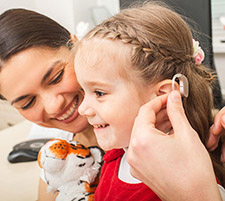
Audiology care
Hearing and balance are important to your overall health and everyday life. If you are experiencing a hearing impairment, tinnitus or a balance disorder, you may benefit from the services of an audiologist. At Allina Health, our audiologists provide expert care in the prevention, diagnosis and treatment of hearing and balance disorders. Whether you need a hearing test, hearing aids, help with tinnitus, testing for vertigo or balance, or cochlear implants, our audiologists can help.

Hearing Evaluations
Schedule a hearing evaluation at one of our audiology clinics in the Metropolitan area. New to Allina Health? Call 612-262-5520 to schedule.

Hearing Aids
Our audiologists will help you select the right type of hearing device for you from hearing aids to Baha and Cochlear Implants.
Audiology care at Allina Health
A hearing impairment is one of the most common health conditions. It is estimated that 15 percent of American adults have some trouble hearing, and 25 million Americans experience an episode of tinnitus each year. Hearing loss can be so gradual that you may not notice it at first. If left unnoticed and untreated, it can cause frustration, fatigue and social isolation.
At Allina Health, our expert audiologists (also known as hearing specialists) can help prevent, diagnose and treat hearing and balance disorders, including hearing loss and tinnitus. We use the latest technology in a comfortable, caring environment to tailor services to your lifestyle and communication needs.
Audiologists at Allina Health can help you with:
- hearing evaluations (audiology exams)
- hearing aid fittings, follow up and repair
- individual and family counseling on preventing and coping with hearing loss
- coordination of physician referrals, as needed
Hearing disorders
During a hearing examination, the audiologist will first conduct a physical examination of your ears. The provider will use an otoscope to look into your ears for any physical condition that may be contributing to your hearing loss, such as wax buildup, ear infections or rupture.
You may also undergo the following examinations:
- A tone test to measure how well you distinguish high and low tones, as well as soft tones.
- A speech test in which you will be asked to repeat words and phrases.
- A pressure test to check the flexibility of your eardrum.
Balance disorders
A balance disorder can cause you to fall or feel dizziness or vertigo, a severe form of dizziness that can lead to headache, nausea and vomiting. These conditions are often caused by ear infections or diseases of the inner ear, such as vestibular neuritis and Meniere's disease.
As with hearing impairment, your audiologist will begin with a physical examination of your ears. Additional testing may be needed, including:
- medical imaging
- postural tests to see if certain movements or postures cause the imbalance
- eye examinations
- blood pressure and heart rate
Treatment of hearing and balance disorders at Allina Health
Treating an underlying ear infection or other ear disease will most often correct the hearing impairment or balance problem. In some cases, hearing damage may be permanent, and a hearing aid may be prescribed.
Other treatments may include:
- medication
- diet or lifestyle change may be recommended for conditions, such as Meniere’s disease to prevent fluid
- positioning therapy to clear particles out of the inner ear
- surgery